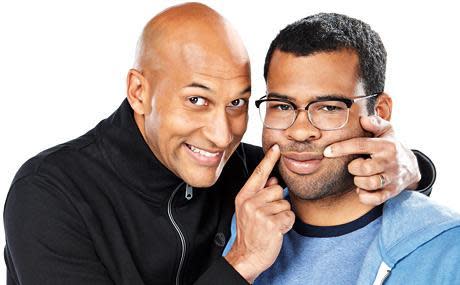'Key and Peele' Finale Review: Taking A U-Turn

Key & Peele concluded a five-season run on Wednesday night by pulling over to the side of the road on that long stretch of desert highway they’ve traveled all season, and pulling a u-turn, heading back to… what?
As much as we might wish Keegan-Michael Key and Jordan Peele had continued their journey, they must feel great going out on top creatively. It was a terrific final season, and the closing hour, back-to-back episodes, served as a summation of the series.
There was a fine Megan-and-Andre sketch — a break-up scene, in fact. Was it intended as an echo of Key and Peele’s decision to pursue separate projects? I doubt it. Andre told Megan she was too controlling, but Megan ultimately guilted him into sticking around. Later, on “The Morty Jepsen Show,” Key, doing a sort of Larry King sitting at a round Charlie Rose table, interviewed Peele as rapper Young Bid’ness. When the questions got too personal for the musician, he stalked off angrily — or rather, tried to stalk off: his microphone wire got tangled up in his clothing, marring his dramatic exit. It was a sketch built on the duo’s gift for physical comedy, a trait not often remarked upon for a team best known for its cerebral take on culture, low and high.
The hour was uneven. A bit in which Key’s character sported what Peele called a “Hitler mustache” and Key insisted was “a Charlie Chaplin mustache” went right where you expected it to go, with Key’s mustachioed man displaying a swastika and talking about rounding up a certain group of people (“comedy haters”), all the while insisting he harbored no Nazi-like feelings.
There were a few funny outtakes, and a marvelous Ray Parler, Jr., moment, with Peele as Parker, hawking a series of CDs: “Three Volumes of Never-Used Hits,” all of them variations on his Ghostbusters theme song, but for movies like 50 Shades of Grey. It was very funny, even if I did feel a tad sorry for Parker, much of whose music with Raydio I still admire without a trace of guilt.
Tellingly, Key and Peele repeated their great video from earlier this season, “Negrotown.” It served as a summation of everything their show stood for: an intelligently funny dissection of the serious insanity of racism, festooned in radiant colors — a vision of joy that did not mask mingled sentiments of outrage and sorrow.
In one of their last chats in the car, Peele asserted that Key & Peele was “the greatest” — long pause — “comedy or otherwise.” Pause. “Show ever made.” Despite Key’s dubious glance, he ranked their show in the pantheon: “It’s us. Then Dallas. Then The Twilight Zone.”
Key and Peele’s magnificently acted, written, and directed comedy, especially placed in the context of Comedy Central’s often vulgar, less formally rigorous programming, is going to be missed.


